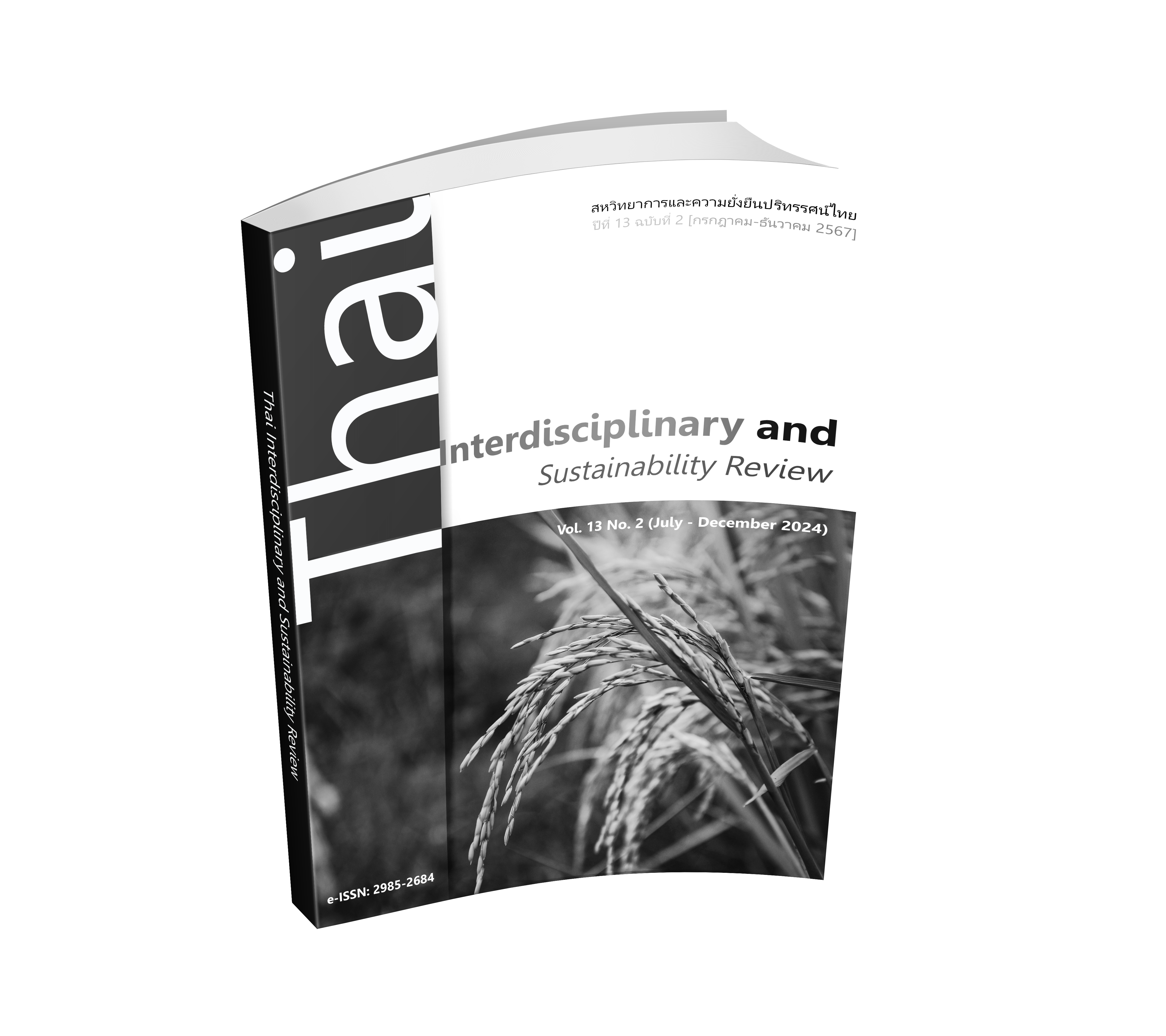WHAT VOTERS WANT TO KNOW ABOUT WHO WILL RUN THE CAPITAL AND INFLUENCE THEIR DECISIONS: LESSONS FROM THAILAND
DOI:
https://doi.org/10.14456/tisr.2024.39Keywords:
Election, Voter, Voting Behavior, Capital Administrator, Local GovernmentAbstract
What voters want to know about candidates and use to decide to vote remains an important question in current political communication. This research aims to find answers to such question, using the 2022 Bangkok gubernatorial election, the capital of Thailand, as a case study. The research results found that voters prioritized political factors, including various policies, political ideology, political stance on the current administration, and political experience. Background information that received similar attention included work experience, honesty, and life success. As for money or compensation to be given, or family background, marital life, appearance, gender, and religion, voters rarely paid attention to the information. The first three factors they used to decide to vote for were work policies, the candidates’ personal characteristics, and political ideology. Personal relationships and money or compensation received were the last two factors that received very little weight. In addition, gender, age, religion, income, household wealth, and political ideology were also important demographic characteristics that showed some trends in the use of these factors in deciding to vote.
Downloads
References
กมลวรรณ ทับทิมทอง. (2565). การเคลื่อนไหวทางสังคมผ่านโซเชียลมีเดีย: ศึกษาผ่านเยาวชนปลดแอก. วารสารเอเชียตะวันออกและอาเซียนศึกษา, 22(1), 50-70.
กิตติศักดิ์ เจิมสิทธิประเสริฐ. (2550). การปฏิวัติสยาม: รากเหง้า/รากเน่า ประชาธิปไตยไทย. ร่วมพฤกษ์, 26(1), 165-189.
กิตติศักด์ เจิมสิทธิประเสริฐ. (2551). พรรคการเมืองไทย ผลิตผลวัฒนธรรมทางการเมืองไทย. วารสารสังคมศาสตร์และมนุษยศาสตร์, 34(2), 69-80.
กิตติศักดิ์ เจิมสิทธิประเสริฐ และ วรสิทธิ์ ภู่ทอง. (2561). อุดมการณ์ทางการเมืองและการให้ความสำคัญต่อคุณสมบัติของว่าที่แฟนของนักศึกษาหญิงไทย. วารสารการบริหารปกครอง, 7(1), 248-271.
จิรวัฒน์ ศิริพานิชย์, สัญญา เคณาภูมิ และ เสาวลักษณ์ โกศลกิตติอัมพร. (2561). ปัจจัยเชิงสาเหตุที่ทรงอิทธิพลต่อการลงคะแนนเสียงเลือกตั้ง. วารสารสถาบันวิจัยและพัฒนา มหาวิทยาลัยราชภัฏมหาสารคาม, 5(1), 311-322.
ชัยพงษ์ สำเนียง. (2564). การเมืองดิจิทัล: การเปลี่ยนภูมิทัศน์ทางการเมืองของคนกลุ่มใหม่ในโลกเสมือน. วารสารพัฒนศาสตร์, 4(2), 1-35.
ณัฐกร วิทิตานนท์. (2565). ย้อนอ่าน คน Krung Thep Maha Nakhon เลือกผู้ว่าฯ กันอย่างไร?. สืบค้นจาก www.the101.world/krung-thep-maha-nakhon-governor-election.
ดารารัตน์ คำเป็ง, ฉัตรทิพย์ ชัยฉกรรจ์ และ ไชยันต์ รัชชกูล. (2562). การสื่อสารทางการเมืองในการเลือกตั้งสมาชิกผู้แทนราษฎร จังหวัดพะเยา พ.ศ.2562 ภายใต้รัฐธรรมนูญแห่งราชอาณาจักรไทย พ.ศ.2560. วารสารสถาบันพระปกเกล้า, 18(1), 108-128.
ถวิลวดี บุรีกุล. (2554). การเมืองเรื่องเลือกตั้งและปัจจัยสำคัญต่อการตัดสินใจเลือกพรรคการเมืองและผู้สมัคร: วิเคราะห์จากการเลือกตั้ง 3 ก.ค. 2554. วารสารสถาบันพระปกเกล้า, 9(2), 5-28.
ธันยพร บัวทอง. (2562). เลือกตั้ง 2562: ซื้อเสียง ไม่ใช่เพียงใช้เงินฟาดก็ชนะ. สืบค้นจาก www.bbc.com/thai/thailand-47520169.
ธีระพงษ์ คงมณี และ วัลลภ พิริยวรรธนะ. (2565). การรับรู้ข่าวสารทางการเมืองต่อการตัดสินใจเลือกตั้งผู้ว่าราชการกรุงเทพมหานครของประชากรภายในกรมยุทธโยธาทหารบก. วารสารการบริหารนิติบุคคลและนวัตกรรมท้องถิ่น, 8(2), 307-318.
บีบีซี. (2565). ชัชชาติ สิทธิพันธุ์: ผู้ว่าฯ กทม. ผู้คว้าคะแนนเลือกตั้งสูงสุดในประวัติศาสตร์. สืบค้นจาก www.bbc.com/thai/61545581.
ประชาไท. (2550). บทวิเคราะห์: ซื้อสิทธิขายเสียง: ปัญหาหรือมายาภาพของสังคมไทย..?. สืบค้นจาก https://prachatai.com/journal/2007/11/14740.
พระครูวาปีธรรมวิโรจน์ (ประศาล นิวัฒ). (2563). บทบาทนักศึกษากับสถานการณ์ทางการเมืองไทย. วารสารวิชาการรัตนบุศย์, 2(2), 99-114.
ภัทรวดี อภิเด่นนภาลัย. (2562). การสื่อสารทางการเมือง ค่านิยม ผลประโยชน์ และระบอบการเมืองที่ส่งผลต่อการตัดสินใจเลือกของประชาชนให้นักการเมืองได้รับเลือกตั้ง พื้นที่จังหวัดสมุทรปราการ เขต 2. วารสารสันติศึกษาปริทรรศน์ มจร, 7(5), 1352-1362.
รพีพร ธงทอง. (2564). การมีส่วนร่วมทางการเมืองสมัยใหม่ของเด็กและเยาวชน. วารสารวิจัยและพัฒนา มหาวิทยาลัยราชภัฏบุรีรัมย์, 16(1), 27-40.
ลลิตพรรณ นุกูลวัฒนวิชัย. (2560). การตลาดทางการเมือง: ศึกษาเปรียบเทียบกลยุทธ์การรณรงค์หาเสียงเลือกตั้งของพรรคประชาธิปัตย์และพรรคเพื่อไทยในการเลือกตั้งผู้ว่าราชการกรุงเทพมหานคร พ.ศ.2556. วารสารรัฐศาสตร์ปริทรรศน์ มหาวิทยาลัยเกษตรศาสตร์, 4(2), 122-144.
วรลักษณ์ พุ่มพวง และ สมเกียรติ วันทะนะ. (2556). บทบาทหัวคะแนนกับการเลือกตั้งในจังหวัดสมุทรสงคราม. วารสารสหวิทยาการวิจัย: ฉบับบัณฑิตศึกษา, 2(2), 146-159.
วัลลภ รัฐฉัตรานนท์ และ นพพล อัคฮาด. (2555). สถานภาพทางสังคมกับพฤติกรรมการเลือกตั้งในการเลือกตั้งทั่วไป พ.ศ.2554: กรณีศึกษาจากผู้มีสิทธิเลือกตั้งที่อาศัยอยู่ในเขตจตุจักร กรุงเทพมหานคร. วารสารสหวิทยาการวิจัย: ฉบับบัณฑิตศึกษา, 1(1), 33-40.
วิเชียร พรมแก้ว. (2565). ปัจจัยเงื่อนไขจูงใจการใช้สิทธิเลือกตั้ง. วารสารสหวิทยาการวิจัยและวิชาการ, 2(3), 217-230.
วิเชียร หนูช่วย. (2559). การสื่อสารทางการเมือง ยุทธศาสตร์และกลยุทธ์ของ นายชูวิทย์ กมลวิศิษฎ์. วารสารวิชาการมหาวิทยาลัยอีสเทิร์นเอเชีย ฉบับสังคมศาสตร์และมนุษยศาสตร์, 6(2), 199-213.
วิทยาธร ท่อแก้ว. (2563). ทฤษฎีการสื่อสารเพื่อการรณรงค์ทางการเมืองและสังคม. ใน หลักและทฤษฎีการสื่อสารทางการเมืองและการปกครองท้องถิ่นขั้นสูง (หน้า 5-1-5-20). นนทบุรี: มหาวิทยาลัยสุโขทัยธรรมาธิราช.
ศุภเดช ศักดิ์ดวง. (2556). สิริพรรณ: เบื้องหลังวาทกรรมซื้อเสียง...ทำไมคนชนบทถึงเป็นผู้ร้าย?. สืบค้นจาก www.isranews.org/content-page/item/26040-siripan_26040.html.
สุรพงษ์ โสธนะเสถียร และ สุภาภรณ์ ศรีดี. (2563). ทฤษฎีการสื่อสารกับปรากฏการณ์ทางสังคม. ใน หลักและทฤษฎีการสื่อสารทางการเมืองและการปกครองท้องถิ่นขั้นสูง (หน้า 1-1-1-31). นนทบุรี: มหาวิทยาลัยสุโขทัยธรรมาธิราช.
สุรพล พรมกุล. (2559). พฤติกรรมการเลือกตั้งสมาชิกสภาผู้แทนราษฎร พ.ศ.2557 ในจังหวัดขอนแก่น. ธรรมทรรศน์, 15(3), 103-118.
Bhothisawang, P. (2018). Factors Influencing Voters to Local Administration Election in Pattalung Province, Thailand. Asian Political Science Review, 2(1), 57-72.
Chitlaoarporn, C. (2015). The Relationship between the Election and the Democracy. PSAKU International Journal of Interdisciplinary Research, 4(2), 12-16.
Daoust, J., Guévremont, M., & Blais, A. (2024). The (non)-religious voter in Canadian elections. Electoral Studies, 90, 102812.
Freedom House. (2022). Freedom in the World 2022: The Global Expansion of Authoritarian Rule. Washington, D.C.: Freedom House.
Freedom House. (2024). Freedom in the World 2022: The Mounting Damage of Flawed Elections and Armed Conflict. Washington, D.C.: Freedom House.
Fukuyama, F. (1989). The End of History?. The National Interest, 16(Summer), 3-18.
Fukuyama, F. (1992). The End of History and the Last Man. New York: Free Press.
Goldberg, A. (2014). The Impact of Religion on Voting Behaviour - A Multilevel Approach for Switzerland. Swiss Political Science Review, 20(2), 305-329.
Hunklinger, M., & Kleer, P. (2024). Why do LGB vote left? Insight into left-wing voting of lesbian, gay and bisexual citizens in Austria. Electoral Studies, 87, 102727.
Kasayanond, A. (2017). Media and Politics. PSAKU International Journal of Interdisciplinary Research, 6(1), 14-20.
Kenaphoom, S. (2017). Political Utility influence on Political Decision. Asian Political Science Review, 1(2), 1-12.
Kenaphoom, S. (2018). Essence of Political Utility. PSAKU International Journal of Interdisciplinary Research, 7(1), 264-275.
Mahmud, M. (2022). Awareness and Attitudes Towards the Election Campaign of Bangladesh: A Field Study on Selected Area. Asian Political Science Review, 6(2), 1-11.
Mallory, C. (2019). THE 2020 LGBT VOTE: Preferences and Characteristics of LGBT Voters. California: Williams Institute, UCLA School of Law.
Ockey, J. (2017). Team Work: Shifting Patterns and Relationships in Local and National Politics in Thailand. Sojourn: Journal of Social Issues in Southeast Asia, 32, 562-600.
Perrella, A., Brown, S., & Kay, B. (2012). Voting Behaviour among the Gay, Lesbian, Bisexual and Transgendered Electorate. Canadian Journal of Political Science, 45(1), 89-117.
Steele, C., Pemstein, D., & Meserve, S. (2020). Democracy Promotion and Electoral Quality: A Disaggregated Analysis (V-Dem Working Paper 2020:107). Gothenburg: V-Dem Institute.
Wojtasik, W. (2013). Functions of Elections in Democratic Systems. Political Preferences, 4, 25-38.
Wongsuwan, N., Jermsittiparsert, K., Tokeaw, W., & Boonsiri, K. (2022). News Consumption Behaviors among Voters in Capital's Gubernatorial Election: Evidence in Bangkok, Thailand. Przestrzen Spoleczna, 22(1), 305-324.
Wurthmann, L. (2023). German gays go green? Voting behaviour of lesbians, gays, and bisexuals in the 2021 German federal election. Electoral Studies, 81, 102558.

Downloads
Published
How to Cite
Issue
Section
License
Copyright (c) 2024 Authors

This work is licensed under a Creative Commons Attribution-NonCommercial-NoDerivatives 4.0 International License.









.png)


